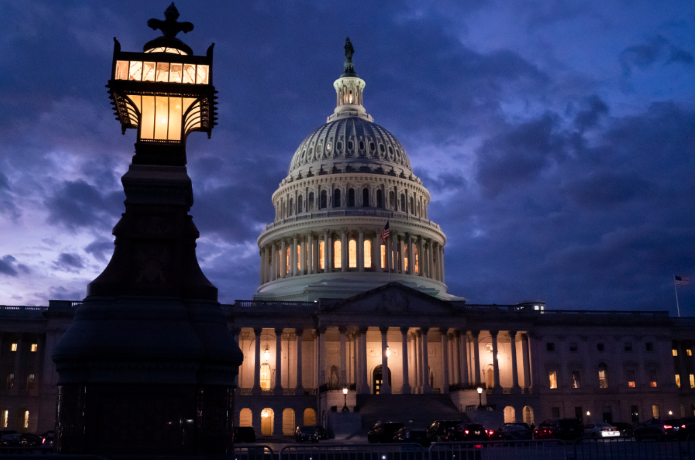On Nov. 15, with government funding set to expire on Nov. 17, the Senate held a bipartisan 87 to 11 vote that passed a stopgap bill to create two new shutdown deadlines on Jan. 19 and Feb. 2.
On Nov. 16, President Biden signed the temporary bill into law while hosting the Asia-Pacific Economic Cooperation summit, giving Congress additional time to negotiate long-term spending measures. The unusually structured bill, known as a continuing resolution, extends funding until Jan. 19 for priorities such as military construction, veterans’ affairs, transportation, housing, and the Energy Department. Meanwhile, the rest of the federal government, encompassing any department not covered by the first deadline, will continue to receive funding until Feb. 2, ensuring that the government remains open until after the holiday season.
AP US History and US History teacher Zachery Sinn acknowledged the stopgap bill’s abnormal structure, which unconventionally establishes two future shutdown deadlines rather than one.
“In terms of why [the bill] was structured this way, it’s more that the Republicans want to try and get budget cuts in a number of areas,” Sinn said. “Neither side wanted to give in on their beliefs and by doing this, they are forcing the conversation to come up again in a few months rather than pass a full-year budget resolution that would basically push the conversation all the way until next October.”
Before reaching the Senate, House lawmakers convened on Nov. 14 and passed the short-term stopgap bill with a lopsided 336 to 95 vote, delaying the spending battle until after the holidays. That being said, the plan sparked a heavy backlash from House Republicans who expressed frustration after their requests for deeper spending cuts were not fulfilled. In response, Democrats rejected these demands, deepening partisan divisions and presenting Speaker of the House Mike Johnson with another pressing leadership test. According to Johnson, the approach was chosen to appease the House conservatives who sought to force spending concessions, yet these were the same legislators who voted against the bill due to its failure to cut government spending.
To appease liberals on the other end of the political aisle, the continuing resolution did not include any spending cuts or package that would cover aid for Israel and Ukraine, humanitarian assistance for refugees, or US-Mexico border security. After the last near government shutdown on Oct. 3 led to former Speaker of the House Kevin McCarthy’s removal from power and left the House without a Speaker for three weeks, Johnson opted to use a more wary approach to achieve compromise and avoid facing a similar fate.
Sinn highlighted Johnson’s advantage in learning from the mistakes of his predecessor, despite having to preside over an ideologically fractured Republican Party.
“There couldn’t be a repeat of what happened in September,” Sinn said. “Mike Johnson benefited from that, but there was a number of Republicans in the House who voted against the bill. More Democrats in the House voted for the bill than Republicans did. Even that vote shows the lack of unity in the Republican Party.”
In light of President Biden’s $106 billion financial aid request that includes the resources needed to cover these policy areas, Senate Majority Leader Chuck Schumer announced that the Senate will prioritize providing aid for Israel and Ukraine after returning from its Thanksgiving recess. According to an unnamed committee source, House Foreign Affairs Chairman Michael McCaul has regularly received calls from Israeli and Ukrainian leaders worried that the United States’ proposed financial aid may never arrive.
Despite its unconventional format, the bill successfully garnered bipartisan support, a rarity in today’s polarized political climate. On one side of the political aisle, Democrats were content that the provisions of the bill did not include hot-button policies such as reproductive healthcare, while Republicans were eager to avoid a shutdown that would have otherwise closed national parks and disrupted industries such as scientific research and federal regulation.
Sinn explained that the bill was forced to be passed within such a short period to avoid placing unequal blame on either political party for causing the government shutdown.
“There could have been a more long-term solution put into place,” Sinn said. “At the end of the day, we’re coming up to an election year and if one side doesn’t pass a bill or even agree to a compromise, then the other side can turn around to their voters and say, ‘Look, this side wasn’t willing to work with us. That’s why the government shut down.’ Neither side wants to be blamed for a government shutdown, which is why these things tend to come down to the very last minute.”
The threat of a federal government shutdown would have forced lawmakers to confront a staggering $31 trillion debt and withhold pay from nearly 4 million federally employed workers. Yet for now, legislators managed to buy themselves some breathing room before the Jan. 19 deadline, which looms just days after the Iowa caucuses, signaling the beginning of the 2024 presidential campaign season.















